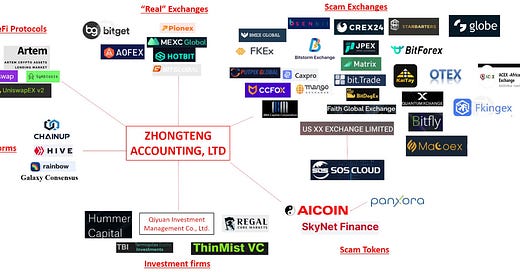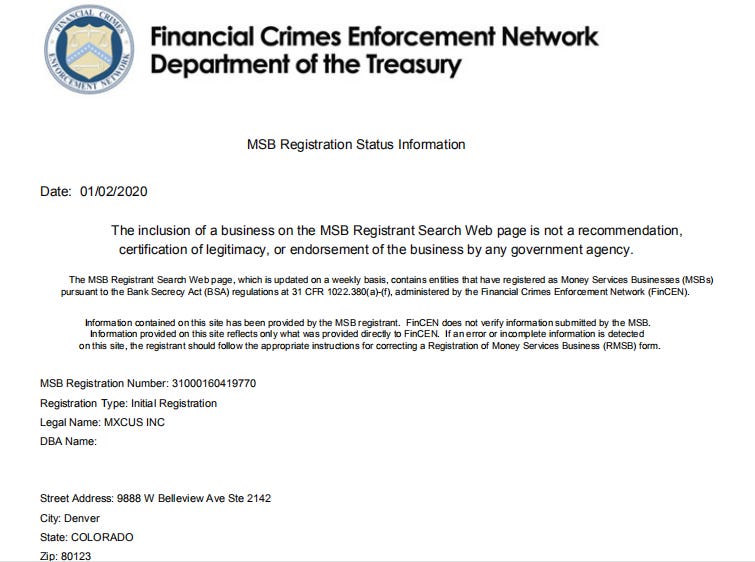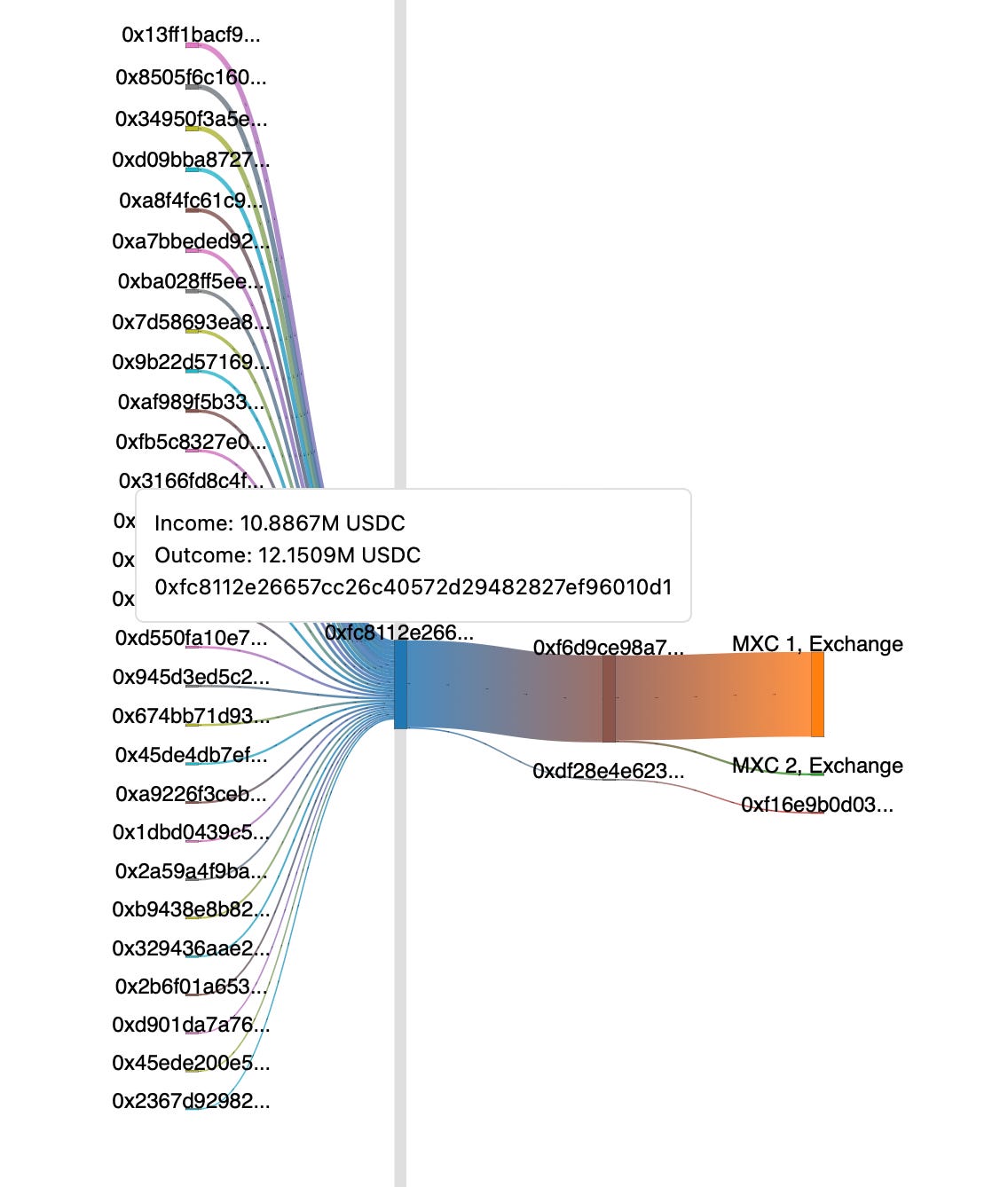The BitDogEx Swindle
A fake crypto exchange sends millions in fraudulent proceeds to a "real" exchange. Both they and dozens of other crypto firms are registered to one Colorado-based firm. What is going on here??
“Sam” was in a dilemma. Starting with only a few thousand dollars, he had recently made over $1 million by partnering with a mysterious cryptocurrency trader he had met on Discord. Now the exchange he and the trader were using, Bitdogex, was sending threatening emails stating that Sam owed thousands of dollars in “taxes” that had to be paid. Otherwise, he could lose his entire investment. So, Sam began sending money.
However, after making several payments, Sam became suspicious. He began researching the Bitdogex exchange and discovered, to his horror, a Twitter thread we published in February entitled “Zhongteng’s Web.” This thread detailed the odd activities of a registered agent in Colorado called Zhongteng Accounting Co, LTD. An agent for over 1100 companies, it happened to represent dozens of crypto-related companies that had registered as money transmitters with the U.S. government:


The largest category of firms were a group of obvious fake crypto exchanges. These exchanges were not recognized as legitimate by aggregators like CoinGecko or CoinMarketCap. Several had warnings online about fraudulent activity.
Unfortunately, BitDogEx was one of these fake exchanges. Through an elaborate ruse, “Sam” had been taken for over $200,000. And it turns out that the money from BitDogex goes to some interesting places…
The Swindle
A young software engineer with a family, Sam had recently emigrated to the United States. Before being scammed by BitDogex, Sam was active in crypto chat groups. One day, he received a message from a young woman named “Nikki.” Nikki said she was a single mom just looking for a friend to talk to. She and Sam began exchanging messages.
Soon, Nikki shared that her aunt was an experienced trader who had developed a “can’t fail” system to trade cryptocurrencies. She encouraged Sam to get in on the ground floor and invest his funds. Initially reluctant to participate, Sam eventually deposited a few thousand dollars to the exchange the aunt claimed to be using, Bitdogex. Later, Sam said that the fact that BitDogex was “licensed” in the United States was what convinced him the site was legitimate. Over a period of weeks, Sam watched in amazement as the money in his Bitdogex account increased exponentially. After only a couple months, his few thousand dollar investment had grown into over $1 million.
However, there was a problem: Sam was then contacted by BitDogex representatives who informed him that he owned hundreds of thousands of dollars in taxes on this windfall. He was sternly warned that, should he not pay, he could lose the entire amount. So, Sam began making transfers of thousands of dollars worth of stablecoins like Tether and USDC. Each time he made a payment, BitDogex informed him that the amount he owed was even more than he had initially been told. Eventually, he had transferred over $200,000 to BitDogex. However, he only received excuses when he attempted to withdraw funds from his BitDogEx account.
Finally becoming suspicious, Sam began digging and eventually stumbled onto a Twitter thread we had published in November of 2021. We had discovered that a registered agent calling itself “Zhongteng Accounting Ltd.” had registered hundreds of companies in Colorado and Washington state. Of these, many that appeared to be crypto-related companies had also obtained federal money services business (MSB) licenses. Notably, this group included multiple “legitimate” cryptocurrency exchanges that are monitored by aggregating services like CoinMarketCap.
One of these exchanges is MEXC Global, a Seychelles-based firm that claims hundreds of millions of dollars in daily crypto trading volume:
Like MEXC Global, BitDogEx is also registered to Zhongteng Accounting Co., LTD and used their Washington-based corporation to obtain a federal MSB license
On-chain Evidence Ties BitDogEx to the MEXC Global Exchange
Realizing he had been duped, Sam contacted us to see if we could help discover where his funds had been sent. He provided the addresses where he had deposited funds and “paid his taxes.” Working backwards from the addresses Sam provided, we discovered a network of multiple wallets pulling in massive sums of money. We verified one of these addresses by creating a BitDogex account:
We discovered a network of wallets. The first layer of deposit addresses accepted transfers from a large number of individual wallets and exchanges. The deposit wallets then sent their funds forward, eventually all collecting to a core wallet. Since this wallet was created in November 2021, it has received over $60 million in USDT ($48 mil), USDC ($12 mil) and Ether ($400,000):
So where does the money go? This is where things get interesting. The USDT sent to the BitDogEx core wallet ends up flowing to a bunch of different wallets, much of which ends up at exchanges like Binance and FTX.
However, things become even more interesting when following the $12 million in USDC sent to this BitDogEx-linked central wallet: Nearly all $12 million gets sent directly to… the MEXC Global exchange!
Are MEXC Global and BitDogEx part of a wider criminal conspiracy?
After we had initially discovered the web of questionable companies tied to Zhongteng, we were left with an unanswered question: Were these companies incidentally linked, or were they all components of a larger, single fraud? After Sam contacted us and shared his information, we believe this is likely the case: BitDogEx’s website and trading interface appear very similar to those of other Zhongteng-linked fake exchanges. Also, there are many addresses feeding into the collecting wallet shown above, only a few of which are definitively linked to BitDogEx. It seems probable that some of these addresses are linked to other fake exchanges in this network. Finally, the fact that MEXC Global received ALL of the USDC from this scam seems too coincidental given their shared registered agent.
There are other interesting scams tied to this network. Perhaps the most interesting of these is “US XX Exchange Limited,” another MSB-licensed firm registered to Zhongteng Accounting. This company was identified as the U.S. subsidiary of the publicly-traded Chinese firm SOS Limited. SOS Limited, formerly “China Rapid Finance,” was exposed by the famous short selling research firm Hindenburg Research in February 2021 as an obvious fraud:


Oddly enough, SOS Limited’s website appears strikingly similar to other Zhongteng firms and promotes many of the same types of services:
Of course, we can’t prove conclusively that these firms are linked beyond the compelling circumstantial evidence shown above… but it all seems a little strange, doesn’t it?














https://dfpi.ca.gov/2022/06/15/california-investor-involved-in-elaborate-scam-on-metatrader-5-platform/
An investigation of TRX as it supports its stablecoin USDD would be interesting. This is one more bubble doubt with the initial minting of the coin.